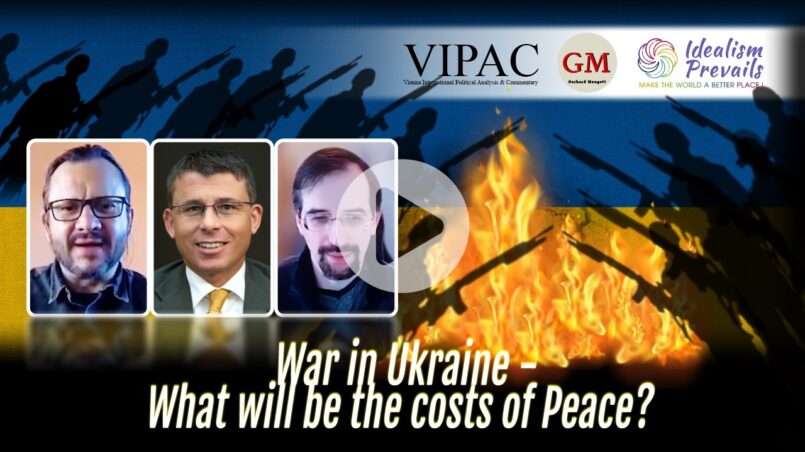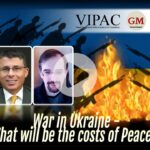War in Ukraine – What will be the costs of Peace?

On March 9th 2022 VIPAC journalists Sascha Stipsits and Mag. Christian Janisch spoke with political science professor Gerhard Mangott, one of the leading Austrian policy experts on Russia and international affairs, about Russia´s war against Ukraine and what the costs of peace will be.
With upcoming negotiations between Russia´s and Ukraine´s foreign minister in Turkey the question how a peaceful solution can be established is front and center.
In recent days Ukraine´s possible NATO membership, the status of Crimea and the future of the Donetsk and Lugansk regions have been discussed a lot in the news.
Russia´s President Putin still insists that Ukraine must never join NATO and that Crimea must be recognized by Ukraine as a part of Russia. In addition Russia also demands that Donesk and Lugansk each become independent republics. At the moment it seems unlikely that Ukrainian President Zelensky will give in to all these Russian demands.
Asked by Mr. Stipsits about the general effect of the economic sanctions on Russia and the ban of Russian oil imports recently announced by US President Biden
Prof. Mangott explains that Russia´s economy in general has been hit very hard by the economic sanctions put in place by the West and that revenues of oil exports are much more important than revenues of gas exports for Russia, but US imports of Russian oil only make up a small proportion of Russia´s overall oil exports.
One certain effect of the Russian oil ban will be that gasoline prices, which have already been on the rise in the USA for months, will rise even more. So American consumers will be directly affected by this decision and Democrats may pay a political price for this decision in the 22´ midterm elections.
Asked about the role of oil producing countries Saudi Arabia, United Arab Emirates and Venezuela and Russia´s role in the Middle East in general Prof. Mangott answers that reactions of most Arabian countries to Russia´s war in Ukraine have been quite diplomatic. So it is no suprise that so far US efforts to convince OPEC plus to increase their oil production have had no real effect.
A possible way to get around Western sanctions might be crypto currencies. Asked about their role and the effects of the Ukraine war on currencies in general Prof. Mangott states that for the foreseeable future the dominance of hard currencies like the US dollar in war times will not be challenged by crypto currencies.
Mr. Janisch asks about the current situation on the ground in Ukraine and Prof. Mangott
explains that like in all wars an information war is taking place and that it is therefor difficult to see through the fog of war, but that Russia most definitely has underestimated Ukraine´s willingness to resist Russia´s invasion.
How does Prof. Mangott inform himself and how does he come to his conclusions?
The well respected political scientist replies that he has a network of contacts and that he is talking to multiple sources and that his professional role in any conflict is to analyze, not to take sides, so analysts should remain sober and must not spread false information.
Prof. Mangott also analyzes the role of mass media (alternative media versus classical media), the credibility of classical media compared to social media, how Russians can consume objective news, the relience of older Russians on state controlled electronic media and how Russians view Putin´s war in Ukraine in general.
New laws in Russia that totally cripple free media and punish anyone who opposes Putin publicly will most probably lead to an exodus of mostly young and better educated Russians in the near future.
Furthermore the role of the Orthodox church in Russia and Ukraine, the relationship between the Russian Orthodoxy and Putin, possible ways how NATO could be dragged into this war, Germany´s decision to heavily invest in it´s army, Ukraine´s EU membership and a neutral status of Ukraine as a way to end the Ukraine war are discussed.
Credits
| Image | Title | Author | License |
|---|---|---|---|
 |
What will be the costs of Peace | Wolfgang Müller | CC BY SA 4.0 |
